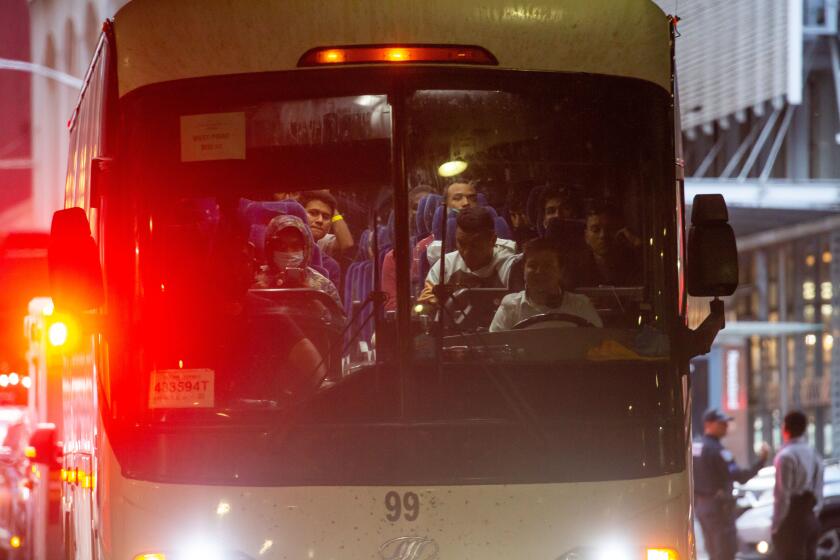California’s tech titans say H-1B visas are vital. Will Trump defy MAGA and support them?

- Share via
- Support for retaining the H-1B visa program from Elon Musk has stirred rage through much of incoming president Trump’s MAGA base.
- But keeping the pipeline open for tech and other skilled workers is seen by many business leaders as critical for the American economy, especially in California.
WASHINGTON — Of all the rich and powerful people cozying up to President-elect Donald Trump, few have rushed to Mar-a-Lago faster than the crowned heads of big tech, including California’s own chiefs of Google and Meta.
And few have a stronger motive to curry Trump’s favor than Silicon Valley: The fate of the H-1B visa program that permits foreign-born computer scientists, engineers and other highly skilled workers to migrate to the United States hangs in the balance.
Support for retaining H-1B from Elon Musk, the incoming president’s new closest associate, has stirred rage through much of Trump’s MAGA base, which is against immigration in almost any form. But keeping the pipeline open for tech and other skilled workers is seen by many business leaders as crucial for the U.S. economy, especially in California.
The low utilization of E-Verify illustrates a “broken U.S. immigration system” and the lack of economic interests in using it. Employers are desperate for labor, documented or not.
The state is by far the biggest user of the H-1B. More than 9,600 employers in California sought clearance for at least one H-1B worker in fiscal 2024, with 78,860 visa applications for new and continuing employment being approved, according to data from U.S. Citizenship and Immigration Services (USCIS).
They include all kinds of skilled workers in various industries, including nurses and science teachers. But the top 10 beneficiaries of H-1B visas in California — accounting for almost one-third of all the approvals — were dominated by tech giants, most of them in the San Francisco Bay Area.
“Those companies are the ones that can afford to hire outside firms that navigate the paperwork, the bureaucracy, and can jump through the hoops,” said Todd O’Boyle, who leads technology policy at the Chamber of Progress, a group backed by big tech firms.
The number of H-1B visas for new employment is capped at 65,000 a year nationally. An additional 20,000 are set aside for foreign nationals who have earned a master’s degree or higher in the U.S. H-1B visas are good for three years but can be extended for up to another three years.
Tech companies in California and elsewhere have relied on the program even as they made massive job cuts after the pandemic, during which many went overboard on hiring and other spending.
The fact that tech companies have fired thousands of American workers while hiring large numbers of foreign workers has added to the fury of anti-immigration Trump supporters, who have long argued immigrants take jobs away from Americans by working for less pay.
The question of whether that claim is valid does not have an easy or simple answer.
U.S. graduate school students in engineering and the sciences are disproportionately foreign-born, and even with that there are shortages of some highly skilled workers, particularly in high-tech engineering and emerging areas such as artificial intelligence.
Nvidia, the major Santa Clara supplier of AI hardware and software, got H-1B visa approvals for more than 1,500 workers last year in California, according to USCIS data. The company declined to comment, and other top tech users of the H-1B, including Google, Meta and Apple, didn’t immediately respond to requests for comment.
“If you lay off a programmer, it’s not the same skill set as somebody who has a post-doctorate in AI, so you have to look at the skills that are sought and why,” said Rep. Zoe Lofgren (D-San José), who sits on the House Subcommittee on Immigration and Citizenship.
But she said the H-1B isn’t without its challenges, pointing to cases in the past at UC San Francisco and Southern California Edison in which U.S. workers were reported displaced by lower-paid H-1B visa holders.
Employers who hire H-1B workers are required to pay wages at least as much as for similar U.S. professionals, but there are abuses. Lofgren said systemic improvements are needed, including stronger analysis on skill sets for the jobs available and more robust advertising on openings.
What’s more, workers from India dominate H-1B visas, in part because there are country quotas for permanent immigration, and temporary work visas are seen as a bridge to that, although the wait is often many years.
“People say the immigration system is broken, and this is part of the brokenness,” Lofgren said, adding that especially for California, “our economy is dependent on, and our prosperity is tied to, immigrants.”
New data show the increasingly crucial role immigrants play in the economy and the American workforce — especially in California.
The acrimony over the H-1B in recent days spiraled after far-right activist Laura Loomer attacked H-1B as a threat to American workers and national security.
She and other critics of worker visas say they lead to fewer jobs for U.S. workers, but academic research over the years has found little evidence to support that claim overall. And although some laid-off workers have been forced to retire or switch careers, studies have found many also have been re-employed relatively quickly.
For computer and mathematical occupations, the November unemployment rate was just 2.5%, up from 1.7% a year ago; and it was unchanged at 2% for architectural and engineering occupations, according to the U.S. Bureau of Labor Statistics.
Loomer suggested a major clash ahead between immigration hardliners such as Stephen Miller, named as Trump’s deputy chief of staff for policy, and those including Vivek Ramaswamy, the former Republican presidential candidate who with Musk has been charged by Trump to cut government spending and regulation.
Musk, the world’s richest person who runs Tesla and SpaceX and is himself an immigrant and onetime H-1B visa holder, has come out championing the hiring of skilled foreign workers.
The visa program has certainly helped Tesla, which this fiscal year received H-1B approvals for 1,765 new and continuing workers, although SpaceX has grown with little benefit of H-1B workers. (Musk moved Tesla’s headquarters to Austin, Texas, from Palo Alto at the end of 2021, and said this year that he was relocating SpaceX to Texas as well.)
“OF COURSE my companies and I would prefer to hire Americans and we DO, as that is MUCH easier than going through the incredibly painful and slow work visa process,” Musk wrote Christmas Day on his social media platform, X. “However, there is dire shortage of extremely talented and motivated engineers in America. It comes down to this: do you want America to WIN or do you want America to LOSE. If you force the world’s best talent to play for the other side, America will LOSE.”
Trump on Saturday seemed to side with Musk.
“I’ve been a believer in H-1B. I have used it many times,” he told the New York Post. “It’s a great program.”
(Trump’s businesses have used predominantly the H-2B program, which are for temporary seasonal workers that hotels and tourist businesses, for example, make heavy use of during summer. H-2A is for temporary farmworkers.)
Despite his record and promises to seal the borders and deport millions of undocumented immigrants, Trump’s remarks raised hopes among some immigration advocates that the incoming president could take a softer tack on H-1B visas.
In his first term, Trump’s team made it a lot tougher for employers to get H-1B approvals, and denial rates jumped above 20% in fiscal years 2018 and 2019, triple the average of the prior administration, according to the National Foundation for American Policy, a Washington think tank that favors higher levels of immigration.
“At minimum it muddies the waters,” said Stuart Anderson, the group’s executive director. “It could signal a neutral policy rather than a hostile one.”
Stephen Yale-Loehr, an immigration expert at Cornell Law School, said that despite the deficiencies in H-1B, he believes that “most employers try to follow the rules. At the macro-level, H-1B workers are helping our economy and creating more jobs for U.S. workers.”
Entrepreneurs, in particular, have talked about skilled worker visas as being crucial for their growth.
Yale-Loehr also noted that recent changes have given U.S. immigration officials greater authority to tighten up the H-1B program, including imposing penalties and inspections.
That could strengthen enforcement and cut down on abuses, if Trump follows through on his supportive remarks.
“It’s too early to see. You’ve got some people in the administration like Elon Musk who want to preserve the H-1B category and other people like Stephen Miller who want to restrict all immigration, including H-1B,” Yale-Loehr said. “We’ll see which side wins over the four years of the Trump administration.”
More to Read
Inside the business of entertainment
The Wide Shot brings you news, analysis and insights on everything from streaming wars to production — and what it all means for the future.
You may occasionally receive promotional content from the Los Angeles Times.














